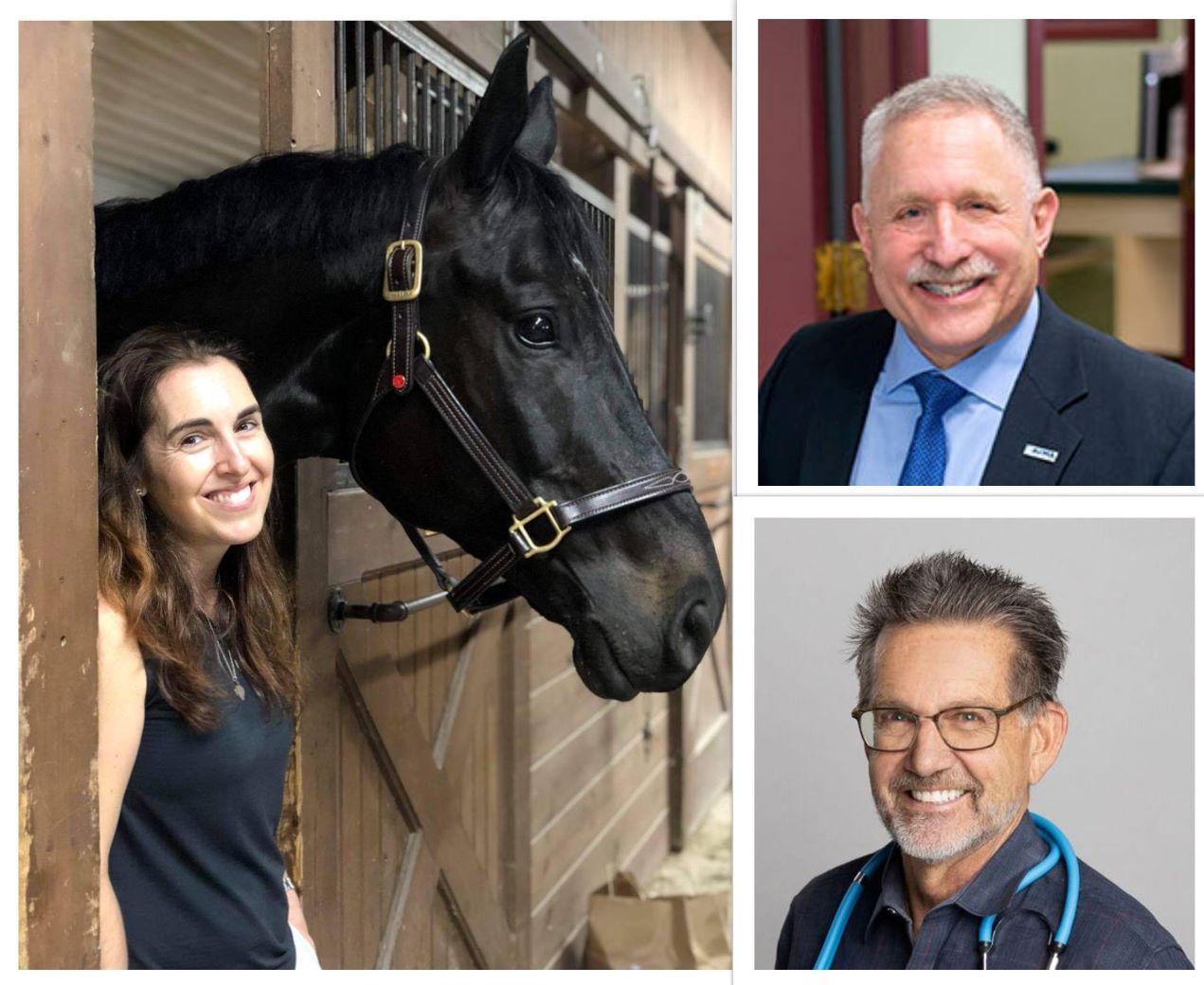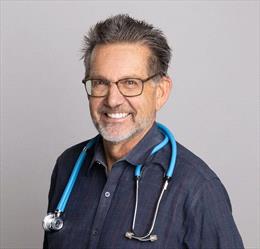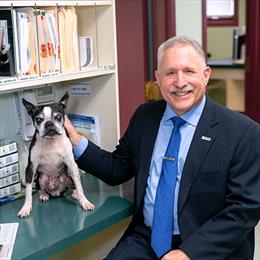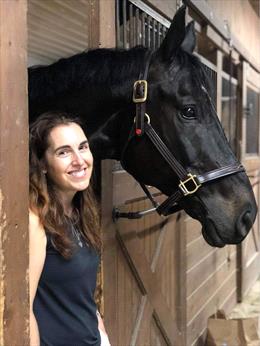!This story has an important update
collage

The candidates for president-elect of the American Veterinary Medical Association are (clockwise from left) Dr. Sandra Faeh Butler, Dr. Arnold Goldman and Dr. Robert Murtaugh.
The competition to become the American Veterinary Medical Association's next president-elect encapsulates the changing veterinary profession. Of three candidates, just one owns an independent practice. The other two are affiliated with major corporate hospital chains.
The candidates are Dr. Arnold Goldman, who owns a small animal practice in Canton, Connecticut; Dr. Sandra Faeh Butler, an executive at National Veterinary Associates; and Dr. Robert Murtaugh of Thrive Pet Healthcare, a specialist who aims to radically alter the AVMA's stance on remote care and increase the nation's supply of veterinarians.
The vote for 2022-23 president-elect takes place on July 14 in Denver by the AVMA House of Delegates, a policymaking body of representatives from every state and more than a dozen allied groups. Next summer, the newly installed president will begin a one-year term in a role designed to espouse AVMA policies and promote the profession.
Faeh Butler and Goldman have both spent decades in organized veterinary medicine. Faeh Butler most recently served as AVMA vice president. Goldman is completing a six-year term as AVMA treasurer next week.
Murtaugh, by contrast, is a newcomer to AVMA governance. He aims to reshape the role of president from one of an ambassador to include policymaker. In particular, Murtaugh supports two changes that contradict current AVMA policy: developing a veterinary midlevel practitioner (comparable to a nurse practitioner in human medicine); and eliminating a long-held requirement that veterinarian-client-patient relationships, or VCPRs, which are necessary to diagnose and treat health conditions, be established in person.
Allowing VCPRs to be established remotely is a position pushed by pro-telemedicine advocates.
Murtaugh is using his candidacy as a platform to push his policy beliefs. "I've got no misconceptions," he told the VIN News Service. "I'm a long shot with slim-to-no opportunity to win. My intent is to address the issues that the AVMA isn't addressing, which are the workforce shortage and why are we still in the 1980s when it comes to telemedicine."
Urging change
Murtaugh recognizes that the role of AVMA president traditionally is one of ambassador and communicator. "But that doesn't mean they can't be an advocate for change within the boundaries of AVMA leadership, and I would push an agenda, if elected," he promised.
Dr. Robert Murtaugh

Photo courtesy of Dr. Robert Murtaugh
Dr. Robert Murtaugh said he's running for office to press the need for midlevel practitioners and easier access to telemedicine.
"The first discussion would be, maybe we need to change our stance on what's a legitimate VCPR," he continued. "I've been very clear from the very beginning what I stand for. I would say that a vote for me is a vote for changing AVMA policies."
Murtaugh, of Wimberley, Texas, is a 1980 veterinary graduate of the University of Minnesota and a diplomate of the American College of Veterinary Internal Medicine and the American College of Veterinary Emergency and Critical Care. He is a former chair of the AVMA American Board of Veterinary Specialties.
Murtaugh's career spans academia, clinical practice and corporate leadership. For nearly 15 years, he was on faculty at the Cummings School of Veterinary Medicine at Tufts University and became director of the program's small and large animal teaching hospitals. He left Tufts in 1998 for a job as chief of staff for the nonprofit Dove Lewis Emergency Animal Hospital Group in Portland. In 2000, he joined VCA Animal Hospital and was promoted to regional medical director. He left VCA in 2015 for Pathway Vet Alliance, now Thrive, which he's seen grow from 15 to 350 veterinary locations in 37 states, and was the company's chief professional relations officer until Dec. 31, when he semi-retired. Murtaugh says he remains "an active partner in the company."
His candidacy for AVMA president has spurred vigorous discussion on a message board of the Veterinary Information Network, an online community for the profession and parent of the VIN News Service. Some practitioners express concern that winning the election might give Thrive undue influence on the AVMA, particularly regarding telemedicine.
Murtaugh said his advocacy reflects his personal beliefs, not those of his employer. "I'm not beholden to anybody. I just want to serve the profession," he said.
"We've got to get with the times," he said, rattling off a list of telemedicine's merits: "You can expand your service offerings, bring in new clients, keep more doctors because they can work from home — there's nothing but upside here."
Murtaugh said he's spent close to $100,000 of his own money to campaign for the position because he believes the profession needs an organized approach — that the AVMA can provide — to implementing telemedicine. He cited a new law in Arizona, effective Aug. 1, that will enable veterinarians to establish a VCPR remotely. The law bucks tradition: In most jurisdictions, an in-person exam is required to establish a VCPR. And under most states' rules, veterinarians cannot diagnose patients or prescribe treatments without that VCPR.
Candidate snapshots
Dr. Arnold Goldman, 66
- Grew up in New York
- 1986 graduate of the University of Florida College of Veterinary Medicine
- Connecticut delegate to the AVMA House of Delegates; AVMA treasurer
- Self-employed as a practice owner
- Spouse, Jill, is a retired special education teacher
- Two adult children
Dr. Robert Murtaugh, 66
- Grew up in Minnesota
- 1980 graduate of the University of Minnesota College of Veterinary Medicine
- American Board of Veterinary Specialties representative; American College of Veterinary Emergency Critical Care organizing committee chair
- Employed as Thrive Pet Healthcare chief professional relations officer
- Spouse, Dr. Jill Clark, is a veterinarian
- Two adult children
Murtaugh believes that his campaign rivals represent the status quo: "The AVMA may be pulled kicking and screaming for the next 10 years, but Arizona's legislation is going to be the model of the future with regard to the virtual VCPR."
Chance experience leads to veterinary career
Goldman counters that AVMA bylaws make it "very clear" that the president is an ambassador for the organization, not a solo changemaker. "As much as we can aspire for change, when push comes to shove, you're obligated to advocate for the AVMA's positions as president because you're representing all members.
"If you're going to lead the AVMA," he continued, "you need to believe in the organization as it is and the processes that lead to them."
Goldman plans to continue seeing patients at Canton Animal Hospital in Connecticut, which he's owned and operated for nearly three decades. "I'm the only independent practitioner in this race," he said. "Win or lose, I intend to continue to practice."
Goldman's journey to becoming a veterinarian is not one he envisioned as a child. Growing up with modest means in Staten Island, he'd never had the opportunity to visit a veterinary clinic. His interest in the profession was piqued in 1976, while studying at the State University of New York at New Paltz, where on a whim, he took a one-credit undergraduate course in pet care and first aid taught by a local veterinarian.
"Part of the course was going to [the practice] and observing them at work, in surgery and everything," he recalled. "From the first visit I was hooked, and I knew what I wanted to do for the rest of my life."
During the next two years, Goldman volunteered at the practice, getting to and from the clinic — a short distance from campus — by hitchhiking. "It was the late '70s," he laughed, by way of explaining the culture of the time. "After that, everything I did in college and graduate school was aimed at getting into veterinary school. Knowing I needed large animal experience, I also started volunteering at a large animal practice. But by then I had a car, so I didn't need to hitchhike to get there."
Goldman attended the University of Florida College of Veterinary Medicine, graduating in 1986. He lived and worked throughout New England and opened his own practice in Connecticut nine years later.
Goldman said he's proud to be a longtime staple of organized veterinary medicine who's served state and national associations. In 2011, he became Connecticut's delegate to the AVMA House and later served on the AVMA State Advocacy and Governance Performance Review committees. In 2017, he was elected to a six-year term as treasurer.
As AVMA president, Goldman said he would not shy from talking about the profession's challenges, such as student debt and mental health, but he plans to keep the tone positive.
"I'm not naive. I know we have to deal with these things, and the AVMA is doing a lot, I believe, especially to address the needs of our youngest members," he said. "But at the same time, it's important that we maintain optimism and express a little gratitude for the opportunity we've had to be veterinarians."
At its core, Goldman said, the profession is about building and maintaining relationships "with the public, with clients, with each other." For that reason, he personally supports the AVMA's stance on seeing patients in the flesh before providing remote care.
"Telemedicine can be a good stop-gap measure, but you're so limited without a hands-on exam," he said. "Veterinary practice is all about communication and interpretation, and many clients can grossly misinterpret and miscommunicate what they see, which makes remote care limiting."
Dr. Arnold Goldman

Photo courtesy of Dr. Arnold Goldman
Dr. Arnold Goldman was inspired to pursue veterinary medicine after a chance encounter in college. He is the only independent practice owner in the race for AVMA president-elect.
He also believes that creating a new category of practitioner — somewhere between a technician and fully licensed veterinarian — will adversely impact the professional development of support staff, in particular.
"I'm worried that creating a new professional will push technicians aside, and they'll get less opportunity to advance their careers, hastening their departure when we need them more than ever," he said.
That stance reflects the consensus of an AVMA House discussion on the topic in January.
A passion for mentorship
Faeh Butler echoed Goldman's view that the role of AVMA president is "more the figurehead and spokesperson than anything else."
"Not to say that they don't have a voice, they do," she said, but her personal views about VCPR parameters, telemedicine and the prospect of a new category of veterinary professionals align with AVMA policies. She also does not see her role at NVA — one of the world's largest practice consolidators — presenting a conflict of interest.
"I think NVA values are very similar to the AVMA's," Faeh Butler said. "They're very aligned in their thought processes on the issues that we have right now." For example, she said, NVA has joined the AVMA's Coalition for Connected Veterinary Care, an alliance of veterinary and animal health organizations that "respect the integrity of the veterinarian-client-patient relationship and support the way veterinarians practice."
Dr. Sandra Faeh Butler

Photo courtesy of Dr. Sandra Faeh Butler
Dr. Sandra Faeh Butler credits her love of animals to the fact that her Swiss immigrant parents frequently moved the family before settling in the Chicago area. "I didn't have a lot of friends, but my pets were always there," she said.
Like the other candidates, Faeh Butler has spent her career serving professional organizations. She began as president of the Student American Veterinary Medical Association in 1995, while attending the University of Illinois College of Veterinary Medicine.
Her role in SAVMA opened doors to other leadership positions. She volunteered with the Chicago Veterinary Medical Association and eventually was elected president. In 2012, she was selected to represent Illinois as a delegate to the AVMA House. She recalls watching in 2015 as her former SAVMA adviser, Dr. Joe Kinnarney, became AVMA president "and thinking, I want to do that." She left her post as delegate in August 2020 for a two-year term as AVMA vice president.
One of Faeh Butler's passions is mentoring new veterinarians. The interest is born out of her own experience as a young practitioner. A week into her first job in clinical practice in Florida, she found herself on call for overnight emergencies and alone with a dying Chihuahua, the only doctor on the premises. "The little dog had been struck by a car," she recalled. She did the best she could, but it wasn't enough. "The dog was euthanized the next day," she said.
The stress of that incident and others during the nighttime emergency shifts took a toll. "I left that practice after about six months," Faeh Butler said. "I had no mentoring there."
Jaded, she returned home to Naperville, Illinois. Right away, she found a job where, she said, she received the guidance she needed. After a couple of years, she left for another practice that was growing and became a partner in three more.
In January 2020, she and her partners sold the four clinics to NVA.
Faeh Butler stayed with NVA and in October 2021, began building the company's mentorship program. Today, she said, more than 16 mentors from across the country provide guidance to some 300 new graduates and early career doctors, both inside and outside of their practices.
Though employed by a corporate practice chain, Faeh Butler said she believes in private practice, as well. "I feel really strongly about private ownership, and it's worrisome to me that there [seems to be] a lot fewer students interested in it."
July 14 update: Faeh Butler won the race for president-elect. She'll be installed as AVMA president in June 2024.